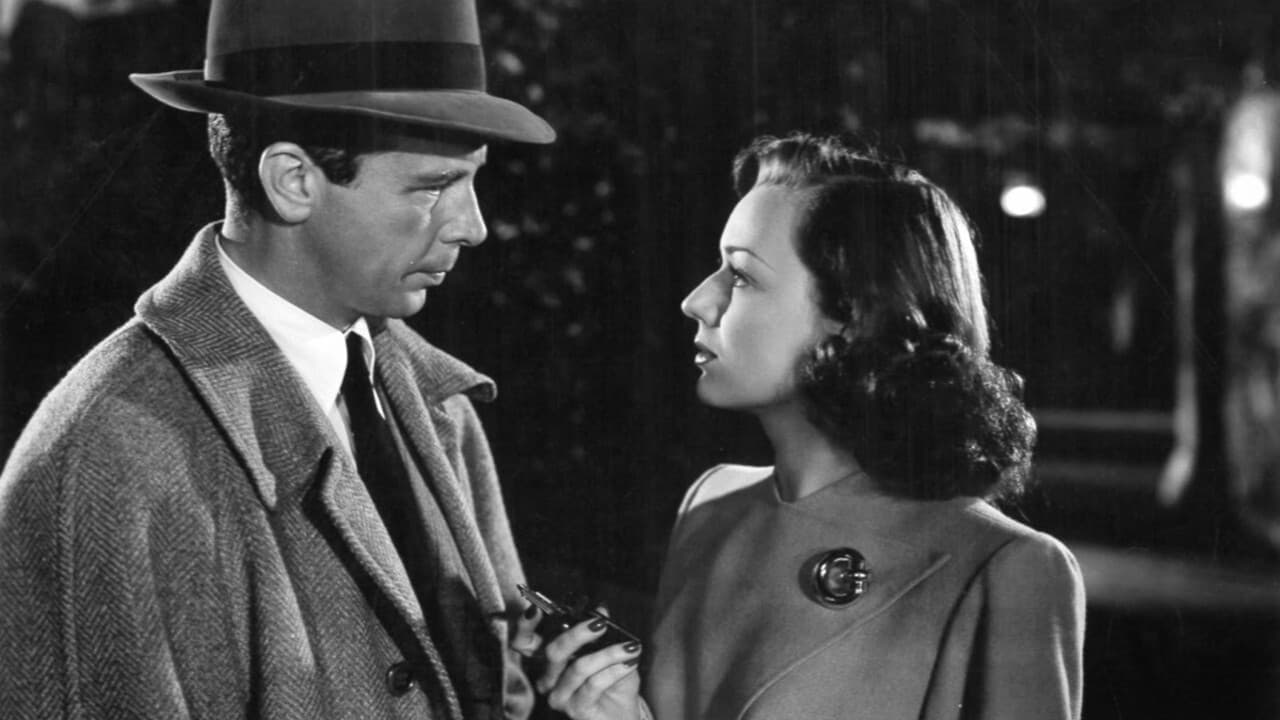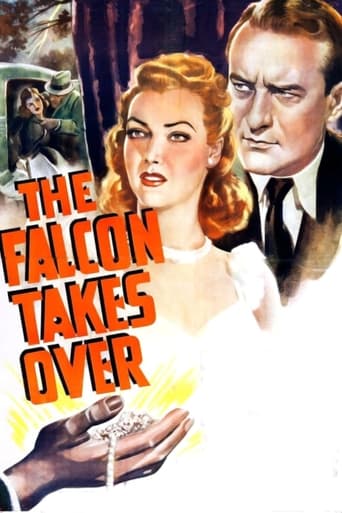



This movie is the proof that the world is becoming a sick and dumb place
View MoreDon't listen to the negative reviews
Boring, long, and too preachy.
if their story seems completely bonkers, almost like a feverish work of fiction, you ain't heard nothing yet.
View MoreFor The Falcon Takes Over the folks at RKO chose an impeccable source in the person of Raymond Chandler for this film. It's based on the famous Chandler novel Farewell My Lovely which both Dick Powell and Robert Mitchum played Philip Marlowe in two different versions.But in this first adaption the private eye is our protagonist the urbane and witty Falcon played by George Sanders. RKO didn't even bother to change the names of the rest of the characters, just grafted the Falcon series regulars in the story.Standing out in the cast is Ward Bond playing the hulking Moose Malloy fresh out of stir and looking for his Velma. Helen Gilbert is the selfsame Velma for whom the Moose did a prison stretch for and who thanks him for that solid favor properly. Lynn Bari plays a would be reporter who gets the scoop of her life when the Falcon breaks the case. And Anne Revere really stands out as the dipsomaniacal Jessie Florian.Having seen the two classic later versions first didn't spoil this one for me. It's a solid entry in the Falcon film series though it doesn't have the style and ambiance of the Powell and Mitchum versions.How could it?
View MoreAs I watched the opening credits, I was surprised to see that this Falcon movie was actually based on the Raymond Chandler book "Farewell, My Lovely"--which I'd seen twice before in the forms of MURDER, MY SWEET (1944) and FAREWELL, MY LOVELY (1975). What particularly surprised me about this is that was a originally Philip Marlowe story, NOT a Gay Lawrence (a.k.a. "The Falcon") film. Now Raymond Chandler purists might balk at this, but the film actually compares reasonably well to these later films--even with a leading man who is so unlike the hard-boiled detective, Marlowe. While the settings were "classed up" quite a bit compared to the novel, the overall plot is still there with only a few minor changes (such as at the very end and the disposition of "Velma"). Additionally, Allan Jenkins, Lawrence's lady friend and the cops were integrated into the original plot.Now if you were going to rate this film, you can't really compare this RKO B-film to the two later higher budget films. The later films are more faithful to the book, but they also have the advantage of being made AFTER Chandler became more famous--and when producers would have never considered getting rid of the Marlowe character. And, while some might be very critical of the lower budget THE FALCON TAKES OVER, if you compare it to other B-detective series films of the day (such as Boston Blackie, Charlie Chan or The Lone Wolf), it is clearly superior--mostly due to the basic foundation laid by Chandler. Plus, George Sanders is his usual affable and suave character--a guy that's hard not to like even if he isn't as jaded and tough as Marlowe.For lovers of the B-movie genre, this is an exceptional and engaging film--significantly better than the later Tom Conway films in the series. In fact, aside from 'the earlier THE GAY FALCON, it might just be the best in the series.
View MoreWhile out at a local club, Gay Lawrence finds himself close by when a man called Moose Malloy comes into the club looking for his Velma, killing the manager in the process of asking. The police pick up on the case but Gay starts searching for Velma. He picks up a lead that involves a meeting, before getting a call out of the blue from a man looking for help. When the 'case' turns out to be a trap designed to kill Gay, he finds himself in the middle of something bigger than he expected.I'm not sure why, after so many films, the Falcon series suddenly reached into Raymond Chandler for its source material. Perhaps it was the fact that Sanders was fed up doing the films and maybe they were trying to provide of a film for him to work with. Certainly this is a rather different entry in the series that manages to change some elements of the series while also keeping aspects that make it a Falcon film however this is a weakness rather than a plus point because the two aspects detract from one another. Being the first filmed version of Farewell, My Lovely, this film gets off to a good start; in fact I was surprised to see Moose Malloy looking for Velma and I started to think maybe it was spoofing the film, until I realized that this was made a couple of years before the most famous version. The plot is dark and mysterious and is better delivered as noir something that the Falcon film cannot do whilst trying to remain a Falcon film. So although the plot follows the source material well, it never really gets a tone that it deserves.The reason for this is that the material is mixed with the usual Falcon brand of humours and characters. Elements such as Goldy's quips and the discussions between O'Hara and his detective are funny but they don't fit well. Of course this hurts the Chandler material more than it hurts the Falcon series because the addition of a good plot helps add to the usual Falcon aspects so it turns out to be a good Falcon film but a very average version of the Chandler story. The cast don't really help either, some failing on their own terms while others show their shortcomings when compared to different actors playing the same roles in other versions. Sanders was one film away from leaving the series as with his suicide, when he had had his fill of things he simply stepped out without fuss. In his performance here you can see that his heart is not in it anymore - he makes little effort with the material given him although it is not all his fault; he couldn't be expected to suddenly turn the Falcon into the complex, downbeat hero of Chandler's story. Jenkins does his usual stuff pretty well but I think he knew that he was an add-on to the story and he tried hard to compensate. Gleason is pretty funny in a minor role but the story specific characters are not as well played as they would later be. Bond may well have been a good model for later versions but he is not as good as them. He tries hard and has a good presence but I just found it hard to accept him as the character. The actresses in the roles of Velma and Riordan are all OK, but nothing more than that. Overall this is an OK Falcon film despite the weaknesses. The plot is better than normal but not as well used as the same source would be in other films later on. The Falcon humour and character take away from the core of the story and stop it being the noir it deserves to be, while the mix of material and series formula is not totally successful not quite oil/water but certainly strange bedfellows. Fans of the Falcon and Chandler completists will seek it out but for most people it will just be an average crime film or a poor version of a story done better elsewhere.
View MoreThis little known entry in a minor series might ring a few more bells when it is known that 'the Falcon takes over' is the first adaptation of Raymond Chandler's wonderful novel 'Farewell my Lovely'. And rather good it is too. Unlike its more famous successors - Edward Dmytryk's 1943 'Murder my sweet' and Dick Richards' 1975 remake, both the very definition of earnest film noir and neo-noir - this film has a vein of parody, irony and wit, that brings it closer to Robert Altman's iconoclastic 'The Long Goodbye', or, at the very least, Eddie Constantine's Lemmy Caution series of films in France.Of course, this has largely to do with the fixed needs of an already established series, to which any source material was fitted - Chandler was clearly just another hack writer towards whom little respect need be paid. There is none of Chandler's profound disillusionment here, no attempt to trace a society or analyse its corruption. this is the noir equivalent of a Broadway musical comedy, with background strictly a setting, like a ship or a drawing room, in which familiar types do their routine. There is no angst-ridden, isolated, defeated knight Philip Marlowe here; in his place is the Falcon, a heavy, louche, even leery amateur of dubious sexuality (like Lemmy he is clumsily eager for the ladies, and tends to bed them as soon as he meets them (or in such a way as Hollywood code could at the time suggest); but he lives a determinedly bachelor life in a large house with his 'bit of rough' sidekick Goldie, who likes to wear incongruously svelte dressing gowns in the morning (another kind of Hollywood code), his unseen fiancee fortuitously miles away).It is important to stress that in the very early days of noir, there was an in-built awareness of the need for parody. Noir is a powerful vision, especially in a culture of such blinding, gaudy brightness as the US. But sometimes, in its macho fatalism and frightened misogyny, it can be an exhausting vision - too much straight noir can be bad for your mental health.But this is not to say that 'Falcon' is just a big joke. Like that other great serial film that transcended its modest origins - 'Sherlock Holmes and the Pearl of Death' - it is closer to the horror film than the detective genre. Moose Molloy's lumbering, unthinking violence is similar to Karloff's Frankenstein. The scene where the Falcon, impersonating a drunk, first meets him, is filmed with mock-horror sensationalism, as is O'Hara's creeping up on Goldie's neck later. There is an attempted murder in a fog-wafting cemetary. The scene at Jules Amthor's exotic haven has the feel of those Egyptian horrors like 'the Mummy' Universal used to churn out in the 1930s, while the soundtrack has the mysterious anxiety of horror rather than the strident fear we expect from noir.In a genre which centres on the detective, on knowledge, on the possibility of explaining and repairing breaks in the social and moral order, the intrusion of horror will be disturbing. It asserts the opposite - the limits of knowledge, darkness over the light of reason, the vulnerability of bodies, the point of breakdown. the Falcon in this mystery is singularly inept, and is only saved from death by a singularly unconvincing deus ex machina. He is utterly exposed, his reason and detective status irrelevant faced with the cold fact of Death in a lonely forest, a very horror milieu. In this way, the amiably silly 'Falcon' is actually closer to the spirit of Chandler than more 'serious', faithful versions (Despite the scriptwriters' brave efforts, though, the plot is typically intransigent!).
View More